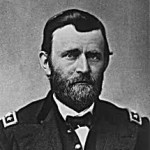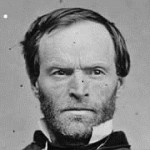 Grant and Sherman met in Cincinnati to plan the strategy to end the war. Sherman was Grant’s closest Army friend and they had supported each other in personal as well as battle crisis for several years. Lincoln was promoting Grant to Lt. General, only one of three men to ever hold that rank in United States history and commander of all Union ground forces. Both Grant and Sherman had impressed the President with their aggressive and tenacious leadership abilities. In addition, they provided Lincoln with much-needed victories in support of his war effort.
Grant and Sherman met in Cincinnati to plan the strategy to end the war. Sherman was Grant’s closest Army friend and they had supported each other in personal as well as battle crisis for several years. Lincoln was promoting Grant to Lt. General, only one of three men to ever hold that rank in United States history and commander of all Union ground forces. Both Grant and Sherman had impressed the President with their aggressive and tenacious leadership abilities. In addition, they provided Lincoln with much-needed victories in support of his war effort.
Grant was in Nashville, in March of 1864, with Sherman when he learned of the promotion. He requested that Sherman travel with him to Cincinnati, Ohio in order to discuss a reorganization of the Army and campaign strategy.
Both men had become heroes in the North and their every move was shadowed by reporters. Few, if any, military secrets or movements could be kept out of the press, North or South. Especially a meeting between two of the North’s most celebrated military leaders. Hence, they booked parlor “A” at the Burnet House after their train arrived in Cincinnati. It would be a short conference, less than 24 hours, after which Grant would travel to Washington, to meet Lincoln and formally accept his promotion.
 Grant spread out his war maps and he and Sherman intensely studied the existing Union deployment, their commanding officers, their strengths and weaknesses. The two generals also noted the Confederate dispositions and discussed the prowess of the opposing leaders.
Grant spread out his war maps and he and Sherman intensely studied the existing Union deployment, their commanding officers, their strengths and weaknesses. The two generals also noted the Confederate dispositions and discussed the prowess of the opposing leaders.
The battle plan decided upon was simple, but decisive. Sherman would command the Western theater, destroy all rebel resources, pursue and annihilate General Joseph Johnston’s army of the Tennessee and basically cut the confederacy in half. Grant would personally handle the rebellion in the Eastern theater, attacking, holding and bludgeoning Robert E. Lee’s Army of Northern Virginia into submission.
Grant returned to Washington immediately after the strategy conference and reported to Lincoln. Grant did not share the details of his meeting with Sherman and the President didn’t ask. President Lincoln trusted, his General in Command.
Bummer


I don’t like to play the Civil War “what if” game, but it is interesting to debate how the war would have played itself out in 1864 if Grant would have remained in the Western Theatre and exercised overall command from there. When Grant was promoted to Lt. General, he had no intentions of setting up shop in Washington, he intended to remain in the field. He actually planned to return West, he did not desire to stay out East, but when he saw firsthand the condition of things with the Army of the Potomac, he resolved to remain there. My opinion is that, had Grant returned West, leaving Meade to make the decisions in Virginia, the Army of the Potomac would not have found itself outside Petersburg in the summer of ’64. I also believe that with Grant calling the shots instead of Sherman, there would have never been a march to the sea.
Michael
Mike
Thanks again for sharing. Bummer always had his doubts concerning Meade’s tenacity. Who knows but it is an interesting senario to ponder. See ya soon.
Bummer
I’m confused about this, Bummer. If they were already meeting in Nashville, why did they need to go all the way up to Cincinnati to discuss this strategy? Maybe I should know but I don’t.
Louis,
Grant had shifted his HQ to Cincinnati previously. In addition, he may have wanted additional privacy, in order to keep the strategy and staff changes under wraps for as long as possible.Grant is quoted as saying; “I never held a council of war in my life. I heard what men had to say–the stream of talk at headquarters,–but I made up my own mind, and from my written orders my staff got their first knowledge of what was to be done. No living man knew of plans until they matured and decided.” Bummer believes that Grant needed Sherman’s council in order to carry out his plan
and felt comfortable using him as a sounding board.
Bummer